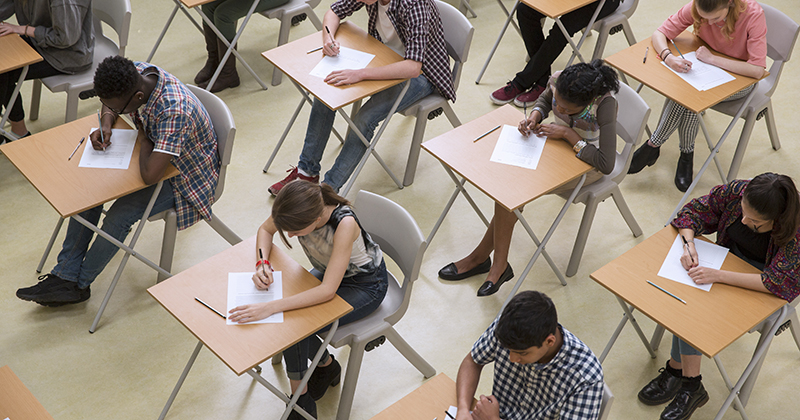Nerves continue their steady upwards ascent as students await the arrival of their GCSE results. But is exam-anxiety really justified? Or are today’s students simply a bunch of ‘snowflakes’?
The truth is that the failure of about one-third of 16-year-olds is baked into our exam system. And we know that this is disproportionately at the detriment of the very disadvantaged students who rely on exam success most as a route to social mobility.
Some argue that this is just the nature of the game: there are winners and losers. That may be true in part, but so is the sobering fact that the examination playing field is not level. Indeed, the attainment gap between disadvantaged students and their more affluent peers is only continuing to widen.
The good news is that there is a lot that teachers can do to give students a fair roll of the dice. But unpicking exam anxiety and breaking the cycle of low self-esteem requires us to challenge a more pervasive stereotype.
A snowflake generation?
First let us look at these ‘snowflakes students,’ so-called because of their apparent lack of resilience, grit, and good old fashioned stiff upper lip. They are the generation who have endured the greatest disruption to their education in modern peacetime, the largest fall in living standards on record and are set to enter the fastest-changing labour market history has ever known.
Rising rates of mental health conditions among them should not be misconstrued as over-sensitivity. Instead, they should signal the severe detriment these unprecedented pressures have inflicted upon their development and wellbeing. They deserve our empathy, not our stigma.
The burden of disadvantage
For the many disadvantaged pupils I have taught, and from my own experience of childhood on a council estate, academic success seems the only clear route to improving your future.
But it is a route cluttered by the obtrusive and steady pressures of growing up in a low-income family. You know that only a few are ever successful in overcoming the odds. Changing your life for the better dangles tenuously on whether you can jump over these obstacles in a hot, sticky exam hall aged just sixteen. It is a heavy burden, and being daunted by it seems a very rational and human response.
In addition, exam anxiety can be a self-fulfilling prophecy. Anxiety around testing impedes knowledge retention and can impact results. Moreover, the precedent it sets is that challenges should be met with apprehension rather than confidence.
Ban the cram
I visit a lot of schools to support pupils and their teachers with their exam strategy. These visits have confirmed to me what I had suspected from 13 years of marking GCSE papers: a tendency to divest time into overloading information and last-minute cramming at the cost of studying the crucial roadmap that is the mark scheme.
Despite its unfortunate prevalence, it is no secret that cramming harms a student’s chances to perform well. It places an unrealistic pressure to retain impossible amounts of information, compounding existing stress, discouraging genuine engagement and making retention even more difficult.
Teaching to the test
Ministers have recently stated that schools have been engaging in too many ‘Plan B tests’ for the purpose of measuring performance in case of exam cancellations. They are right, in part. If these assessments do nothing but mimic the stress of the real thing, they are counter-productive. But by positioning assessments as frequent opportunities for growth and learning rather than mere one-off judgments of ability, they can cultivate positive self-belief.
Suggesting students can enjoy exam preparation might be a stretch. But I have seen countless times how a focus on technique can instantly placate nerves and restore confidence among even the most seemingly disengaged pupils. Hacking into examiners’ mindsets, they become eager to attempt questions, confident that marks are well within their reach. Regular testing and using the mark scheme as a roadmap reinforces that success is attainable.
Schools Week readers won’t need persuading that the ‘snowflakes’ stereotype is damaging and untrue. If we can also accept that teaching to the test is not intrinsically bad, we might just be able to help dispel unnecessary anxiety.
It won’t be enough to level the playing field, but at least our disadvantaged students won’t be starting from behind the blocks.









Your thoughts